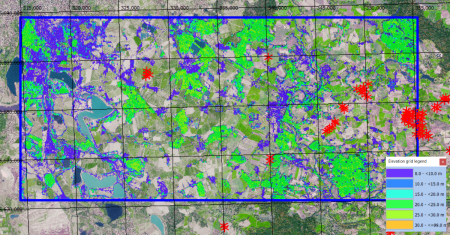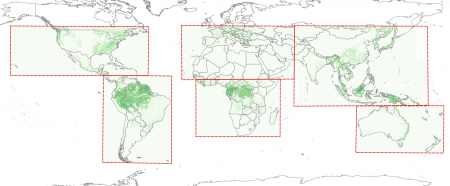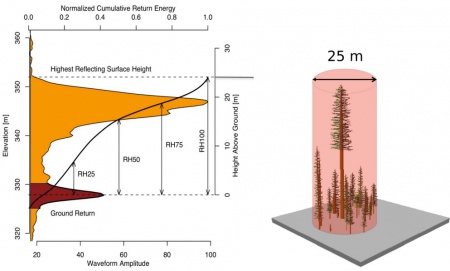Near-Global Forest Canopy Heights GLAD: Difference between revisions
m (Morten moved page Global Forest Canopy Heights GLAD to Near-Global Forest Canopy Heights GLAD: Near-Global Forest Canopy Heights GLAD) |
|||
| (18 intermediate revisions by 3 users not shown) | |||
| Line 1: | Line 1: | ||
[[Category: Online Data]][[Category: Forest Maps]][[File:GLAD_Leipzig_1200x627px.png|right|thumb|450px|Global Forest Map GLAD – Site South-East of Leipzig, Germany.]] | [[Category: Online Data]][[Category: Forest Maps]][[File:GLAD_Leipzig_1200x627px.png|right|thumb|450px|Global Forest Map GLAD – Site South-East of Leipzig, Germany.]] | ||
[[File: | [[File:GLAD_Coverage.png|right|thumb|450px|Coverage for GLAD – Latitudes S52-N52.]][[File:GEDI_WaveForm.jpg|right|thumb|450px|GEDI: Canopy height and profile metrics derived from waveform data. Image Credit: University of Maryland - GEDI Experiment.]][[File:GEDI_Instrument.png|right|thumb|450px|GEDI’s 80 cm telescope. Image Credit: University of Maryland - GEDI Experiment.]] | ||
== Introduction == | == Introduction == | ||
The Near Global Forest Canopy Height (GLAD, 2019) is a dataset developed from a fusion of GEDI lidar data (Global Ecosystem Dynamics Investigation Lidar) and Landsat imagery data. This dataset has a near global spatial coverage ranging from latitudes 52. | The Near Global Forest Canopy Height (GLAD, 2019) is a dataset developed from a fusion of GEDI lidar data (Global Ecosystem Dynamics Investigation Lidar) and Landsat imagery data. This dataset has a near global spatial coverage ranging from latitudes 52.0 S to 52.0 N. Currently (2020) it is to be considered as a prototype map as both machine learning algorithms and available data are still being improved. The dataset was developed by the Global Land Analysis and Discovery (GLAD) laboratory in the Department of Geographical Sciences at the University of Maryland. The data reflects the 95% relative height of the canopy. In the current version, tree heights beyond 30 m are saturated by the machine learning model used. The GEDI instrument is an experiment from the International Space Station: It maps the Earth´s forest and topography using a high-resolution laser. | ||
== Data Applicability and Availability within windPRO == | == Data Applicability and Availability within windPRO == | ||
The forest height data are used as input for the dedicated sub-models in windPRO which | The forest height data are used as input for the dedicated sub-models in windPRO which includes the forest impact on the wind flow. These sub-models are the Displacement Height Calculator and the Objective Roughness Approach (ORA) tool; both models are available from windPRO 3.2+. The forest data is accessed from the online-services from the ‘Elevation Grid Object’ with data-type set to ‘Heights above terrain (a.g.l) for elements’. The data can be accessed from the online-services in the 'Elevation Grid Object' in the following way. | ||
# Open the 'Elevation Grid Object' | # Open the 'Elevation Grid Object' | ||
# | # Set ‘Data type’ to ‘Digital Object Model - representation of the object heights (e.g. forest height) | ||
# Click ‘Add Layer from Online Data‘ | # Click ‘Add Layer from Online Data‘ | ||
== Technical Details == | == Technical Details == | ||
* ''Format:'' Geotiff | * ''Format:'' Geotiff | ||
* ''Pixel values:'' Canopy height 2019 (m) | * ''Pixel values:'' Canopy height 2019 (m) | ||
* ''Spatial resolution:'' 0.00025 degree (approximately | * ''Spatial resolution:'' 0.00025 degree (approximately 30 m) | ||
* ''Geographical coverage:'' From 52.0 to 52. | * ''Geographical coverage:'' From 52.0 S to 52.0 N (thus, most of the world - see coverage map to the right) | ||
* ''Coordinate system:'' WGS84 geographic coordinates (in original data) | * ''Coordinate system:'' WGS84 geographic coordinates (in original data) | ||
* ''Pixel values:'' | * ''Pixel values:'' | ||
** 0-60 - tree height in meters | ** 0-60 - tree height in meters | ||
** 101 Water, 102 Snow/ice, 103 no data (not included in windPRO dataset) | ** 101 Water, 102 Snow/ice, 103 no data (not included in windPRO dataset) | ||
** 32767 is a null value: The pixel does not belong to forestry land or canopy height is outside boundaries set (0. | ** 32767 is a null value: The pixel does not belong to forestry land or canopy height is outside boundaries set (0.5 m to 100 m) | ||
* ''Accuracy (see Potapov et al)'': | |||
** Compared to the GEDI cross-validation data (RMSE = 6.6m; MAE = 4.45m, R2 = 0.62) | |||
** Compared to available airborne lidar data (RMSE = 9.07m; MAE = 6.36m, R2 = 0.61) | |||
== Usage Notes == | |||
# Map is still considered as a prototype - algorithms and data are being improved | |||
# GEDI data overestimate forest height on slopes within temperate and subtropical mountain grasslands (e.g. in New Zealand and Lesotho) | |||
# Tree heights over cities and suburbs may be confounded with building heights | |||
# Canopy heights above 30 m height are underestimated: The machine-learning model used saturated above 30 m: The height of the tallest trees are not adequately represented. | |||
# Geolocation precision and land surface height estimation may be responsible for some map errors | |||
== License and Acknowledgement == | == License and Acknowledgement == | ||
The map | The map has been released into the public domain: The Global Land Analysis and Discovery Laboratory (GLAD) at the Department of Geographical Sciences at the University of Maryland has made the data available free of charge. We recommend using the following attribution when using the data: | ||
<pre> | <pre> | ||
Source: | Source: | ||
| Line 39: | Line 42: | ||
== External Links and References == | == External Links and References == | ||
# P. Potapov, X. Li, A. Hernandez-Serna, A. Tyukavina, M.C. Hansen, A. Kommareddy, A. Pickens, S. Turubanova, H. Tang, C. E. Silva, J. Armston, R. Dubayah, J. B. Blair, M. Hofton (2020): Global Forest Canopy Height (2019) - [https:// | # P. Potapov, X. Li, A. Hernandez-Serna, A. Tyukavina, M.C. Hansen, A. Kommareddy, A. Pickens, S. Turubanova, H. Tang, C. E. Silva, J. Armston, R. Dubayah, J. B. Blair, M. Hofton (2020): Global Forest Canopy Height (2019) - ''In review - preprint is available from zenodo'' - [https://doi.org/10.5281/zenodo.4008406 here] | ||
# GEDI mission homepage - [https://gedi.umd.edu/ here] | # GEDI mission homepage - [https://gedi.umd.edu/ here] | ||
# GEDI instrument overview - [https://gedi.umd.edu/instrument/instrument-overview/ here] | # GEDI instrument overview - [https://gedi.umd.edu/instrument/instrument-overview/ here] | ||
# Global Forest Canopy Height, 2019 - data home page - [https://glad.umd.edu/dataset/gedi/ here] | |||
Latest revision as of 16:34, 25 September 2020




Introduction
The Near Global Forest Canopy Height (GLAD, 2019) is a dataset developed from a fusion of GEDI lidar data (Global Ecosystem Dynamics Investigation Lidar) and Landsat imagery data. This dataset has a near global spatial coverage ranging from latitudes 52.0 S to 52.0 N. Currently (2020) it is to be considered as a prototype map as both machine learning algorithms and available data are still being improved. The dataset was developed by the Global Land Analysis and Discovery (GLAD) laboratory in the Department of Geographical Sciences at the University of Maryland. The data reflects the 95% relative height of the canopy. In the current version, tree heights beyond 30 m are saturated by the machine learning model used. The GEDI instrument is an experiment from the International Space Station: It maps the Earth´s forest and topography using a high-resolution laser.
Data Applicability and Availability within windPRO
The forest height data are used as input for the dedicated sub-models in windPRO which includes the forest impact on the wind flow. These sub-models are the Displacement Height Calculator and the Objective Roughness Approach (ORA) tool; both models are available from windPRO 3.2+. The forest data is accessed from the online-services from the ‘Elevation Grid Object’ with data-type set to ‘Heights above terrain (a.g.l) for elements’. The data can be accessed from the online-services in the 'Elevation Grid Object' in the following way.
- Open the 'Elevation Grid Object'
- Set ‘Data type’ to ‘Digital Object Model - representation of the object heights (e.g. forest height)
- Click ‘Add Layer from Online Data‘
Technical Details
- Format: Geotiff
- Pixel values: Canopy height 2019 (m)
- Spatial resolution: 0.00025 degree (approximately 30 m)
- Geographical coverage: From 52.0 S to 52.0 N (thus, most of the world - see coverage map to the right)
- Coordinate system: WGS84 geographic coordinates (in original data)
- Pixel values:
- 0-60 - tree height in meters
- 101 Water, 102 Snow/ice, 103 no data (not included in windPRO dataset)
- 32767 is a null value: The pixel does not belong to forestry land or canopy height is outside boundaries set (0.5 m to 100 m)
- Accuracy (see Potapov et al):
- Compared to the GEDI cross-validation data (RMSE = 6.6m; MAE = 4.45m, R2 = 0.62)
- Compared to available airborne lidar data (RMSE = 9.07m; MAE = 6.36m, R2 = 0.61)
Usage Notes
- Map is still considered as a prototype - algorithms and data are being improved
- GEDI data overestimate forest height on slopes within temperate and subtropical mountain grasslands (e.g. in New Zealand and Lesotho)
- Tree heights over cities and suburbs may be confounded with building heights
- Canopy heights above 30 m height are underestimated: The machine-learning model used saturated above 30 m: The height of the tallest trees are not adequately represented.
- Geolocation precision and land surface height estimation may be responsible for some map errors
License and Acknowledgement
The map has been released into the public domain: The Global Land Analysis and Discovery Laboratory (GLAD) at the Department of Geographical Sciences at the University of Maryland has made the data available free of charge. We recommend using the following attribution when using the data:
Source: Global forest height data from the Global Land Analysis and Discovery Laboratory (GLAD). GLAD is at the Department of Geographical Sciences at the University of Maryland, USA. Processing and distribution through EMD and windPRO.
External Links and References
- P. Potapov, X. Li, A. Hernandez-Serna, A. Tyukavina, M.C. Hansen, A. Kommareddy, A. Pickens, S. Turubanova, H. Tang, C. E. Silva, J. Armston, R. Dubayah, J. B. Blair, M. Hofton (2020): Global Forest Canopy Height (2019) - In review - preprint is available from zenodo - here
- GEDI mission homepage - here
- GEDI instrument overview - here
- Global Forest Canopy Height, 2019 - data home page - here